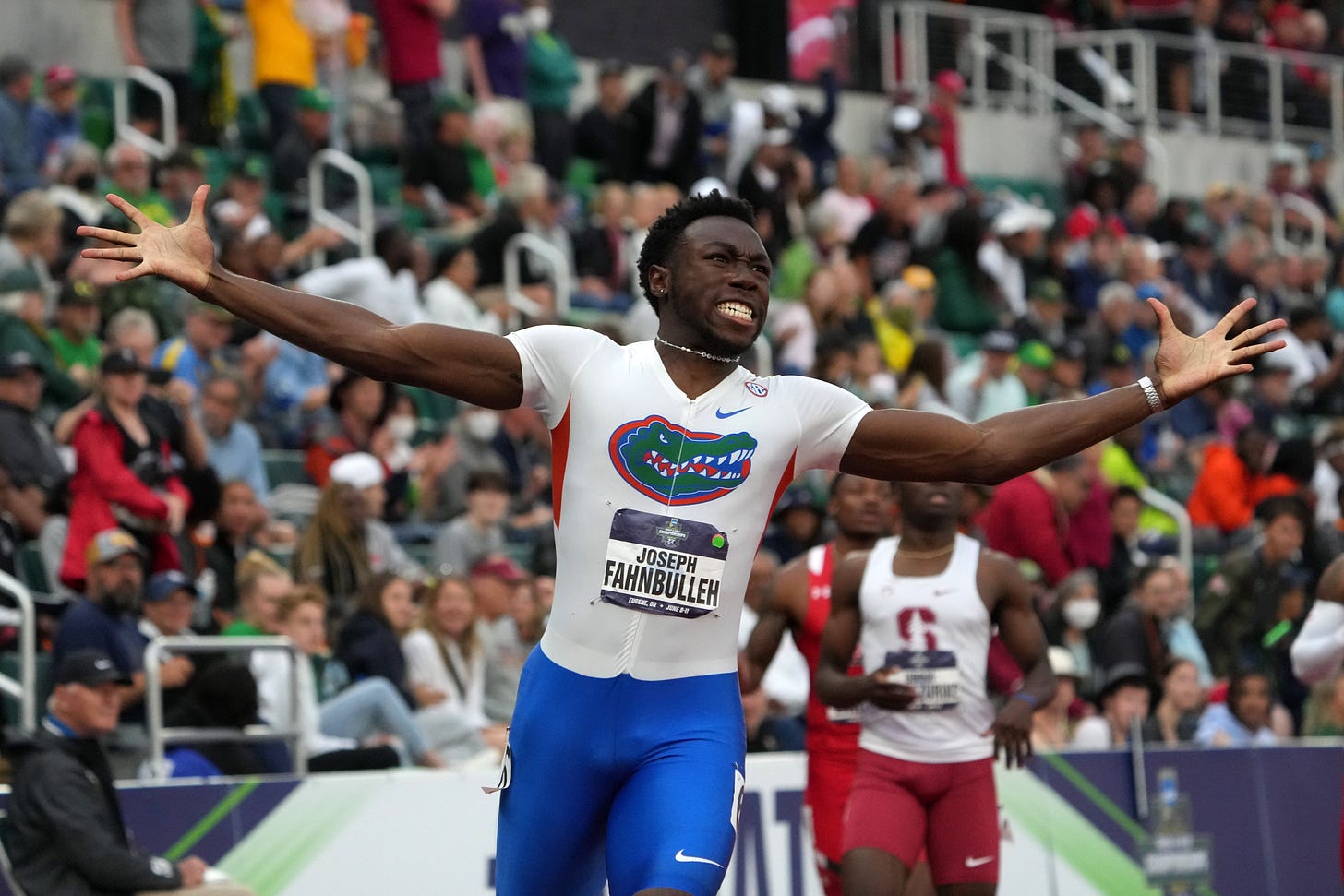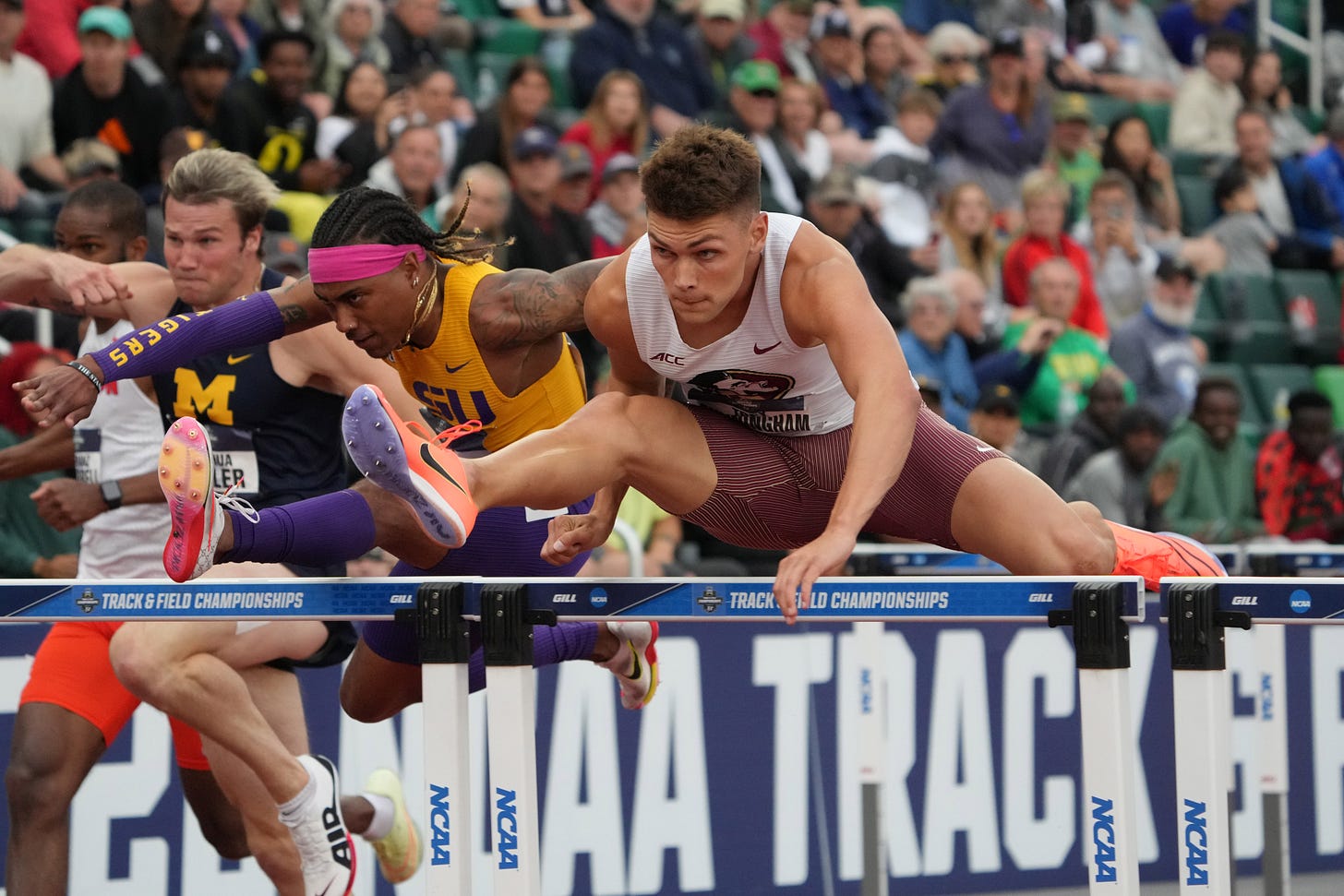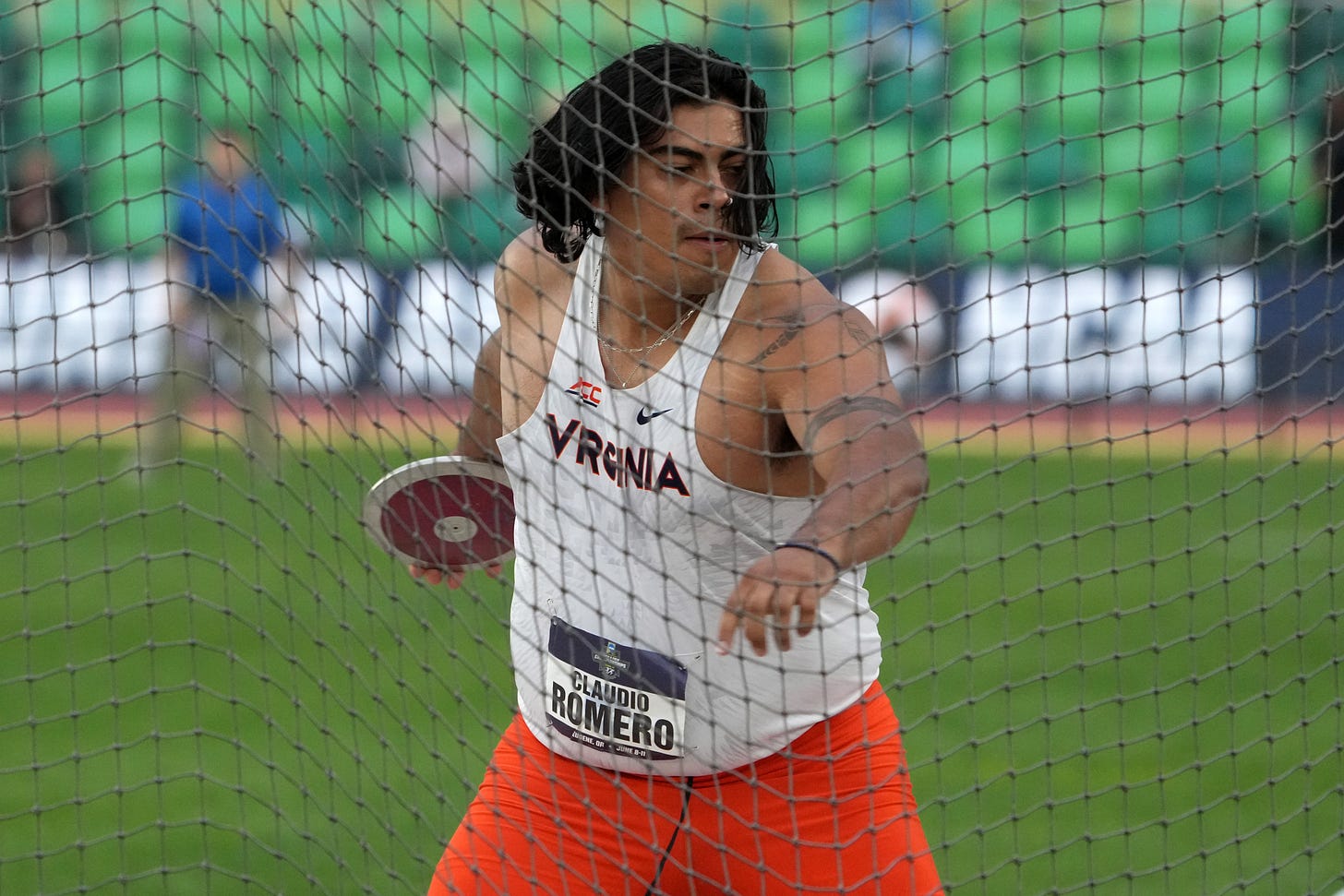Strong finisher leads Florida to national title
Fahnbulleh's superior top-end speed powers victorious sprint double

Joseph Fahnbulleh of the University of Florida is not the smoothest or most graceful sprinter you will ever see. Nor does he possess a quick start.
But when it comes to top-end speed and the ability to close in the second half of a race, there is no one in the collegiate ranks who can rival the Gator sophomore.
That was readily apparent in both the men’s 100 and 200 meters in the NCAA track and field championships at the University of Oregon’s Hayward Field on Friday.
Fahnbulleh got off to his typical less-than-stellar starts in both races, but he overhauled the field in the final 30 meters of the 100 to clock a personal best of 10.00 seconds, and took charge of the 200 with 50 meters left while running a personal best of 19.83 to win his second consecutive title. He also anchored the Gators to a runner-up finish in the 400 relay as they timed 38.52 to USC’s winning 38.49 clocking.
Led by Fahnbulleh, Florida won the team title with a 54-38 victory over runner-up Texas. Tennessee placed third with 34 points, followed by Florida State with 33, Georgia with 32, and LSU with 31. It was the first championship for Florida since the Gators won consecutive titles in 2016-17.
Trey Cunningham of Florida State turned in the best single individual performance of the meet when he won the 110-meter high hurdles in a personal best and yearly world-leading time of 13.00. But Fahnbulleh accounted for more points (22) than anyone in the men’s competition in which the top eight finishers in each event were awarded points on a 10-8-6-5-4-3-2-1 basis.
Fahnbulleh was in ninth – and last – place after the first 25 meters of the 100. But he moved up to seventh at the midway point and had caught everyone at the 70-meter mark.
Favour Ashe of Tennessee finished second in 10.08, followed by Javonte Harding of North Carolina A&T with the same time. Micah Williams of Oregon, who had run a sizzling 9.86 in the West Preliminary meet on May 27, was seventh in 10.19.
Afterward, Fahnbulleh told John Anderson of ESPN that his coaches are always telling him to focus on moving forward down the track. Perhaps that is a way to prevent him from worrying too much about a bad start, because as the confident Fahbulleh said of his closing speed, “If I’m even, I’m gone.”
Fahnbulleh, who placed fifth in the 200 in the Olympic Games in Tokyo last summer while running for Liberia, got off to a decent start in that event on Friday before speeding past first-place Matthew Boling of Georgia halfway down the home straightaway.
Boling had defeated Fahbulleh in the 200 in the Southeastern Conference Championships on May 14, but he was overwhelmed in the rematch as he placed a distant second in 20.13.
Florida Coach Mike Holloway told Anderson afterward that there were a lot of people counting the Gators out before the meet and questioning their team-title chances because they did not have a slew of athletes in the finals. But they made the most of what they had.
In addition to Fahbulleh’s 100 victory, Dedrick Vanover finished fifth in 10.16 to help Florida total 14 points in the event.
The Gators added another 12 points in the 400 when Champion Allison placed second in 44.41 and Ryan Willie finished fifth in 45.00.
Florida’s final 10 points came in the 1,600 relay as Jacory Patterson, Willie, Jacob Miley, and Allison placed first in a meet-record 2 minutes 58.88 seconds, which was only .35 seconds slower than the collegiate record they set earlier this year.
Cunningham just missed tying the collegiate record in the 110 high hurdles as his winning time of 13.00 was two hundredths shy of the 12.98 best set by Grant Holloway of Florida in 2019.
It also put him in a three-way tie for second on the all-time collegiate list with Renaldo Nehemiah of Maryland (1979) and Daniel Roberts of Kentucky (2019), and bettered the previous yearly world-leading mark of 13.07 he ran in the East Preliminary meet on May 27.
Although Cunningham finished fourth in the U.S. Olympic Trials last year, an injury had prevented him from qualifying for the NCAA Championships and the 2020 season had been canceled due to the COVID-19 pandemic. Therefore, he was understandably ecstatic after winning his first national outdoor title in the best time of his career.
He said technical mistakes at the fifth and seventh hurdles cost him a sub-13 time, but he was confident he could avoid making those errors in future races.
Eric Edwards Jr. of LSU ran nearly even with Cunningham for the first five or six hurdles before finishing second in a personal best of 13.15.

In other events, junior Randolph Ross of North Carolina A&T and sophomore Sean Burrell of LSU won their second consecutive titles in the 400 and 400 intermediate hurdles, respectively.
Ross’s time of 44.13 was the third-fastest in the world this year and the second fastest of his career as he ran 43.85 in winning the NCAA title last year.
Burrell ran a stunning world junior record of 47.85 to win the intermediate hurdles in the NCAA meet last year, but he had been slowed by injuries this season and entered the meet with a season best of 50.07.
He bettered than mark with a 49.19 clocking in a semifinal on Wednesday before running 48.70 on Friday.
Claudio Romero of Virginia and Chile was an upset winner in the men’s discus as his best throw of 66.17 meters (217 feet 1 inch) edged fellow freshman Mykolas Alekna of UC Berkeley, who threw 66.15 (217-0).
Alekna, the son of former two-time Olympic and World champion Virgilijus Alekna of Lithuania, set a collegiate record of 68.73 (225-6) in winning the Pacific 12 Conference Championships on May 15 and entered the NCAA meet with the five longest throws in the nation this season.

In other field events, Tejaswin Shankar of Kansas State won the high jump by clearing 2.27 (7-5¼) and Chengegtayi Mapaya of TCU placed first in the triple jump with a personal best of 17.26 (56-7½).
Mapaya’s effort moved him to ninth on the all-time collegiate performer list.
In other races on the track, Ahmed Jaziri of Eastern Kentucky won the 3,000 steeplechase in a personal best of 8:18.70, Moad Zahafi of Texas Tech took the 800 in 1:44.49, Olin Hacker of Wisconsin placed first in the 5,000 in 13:27.73, and Joe Waskom of Washington won the 1,500 in 3:45.58.
Jaziri led a depth-laden race in which the first three runners ran under 8:19 and the first eight ran personal bests.
In the only women’s event contested on Friday, Anna Hall of Florida got off to a rip-roaring start in the first four events of the heptathlon.
The Gator sophomore, who won the heptathlon in the USA Track & Field Combined Events Championships that were held from May 6-7, ran 13.15 in the 100 hurdles, cleared 1.81 (5-11¼) in the high jump, put the shot 13.54 (44-5¼), and ran the 200 in 23.13 for a first-day total of 3.922 points.
After setting heptathlon bests in the hurdles, shot put, and 200, and tying her season best in the high jump, Hall appears to have a solid chance at breaking the collegiate record of 6,527 points that was set by Diane Guthrie of George Mason in 1995.
Hall will compete in the final three events of the heptathlon on Saturday, as well as in the final of the 400 hurdles.
The meet will begin with the heptathlon long jump at 10:30 a.m., Pacific time.
The first field event, the women’s high jump, will begin at 2 p.m., with the first track event, the 400 relay, starting at 2:32.



